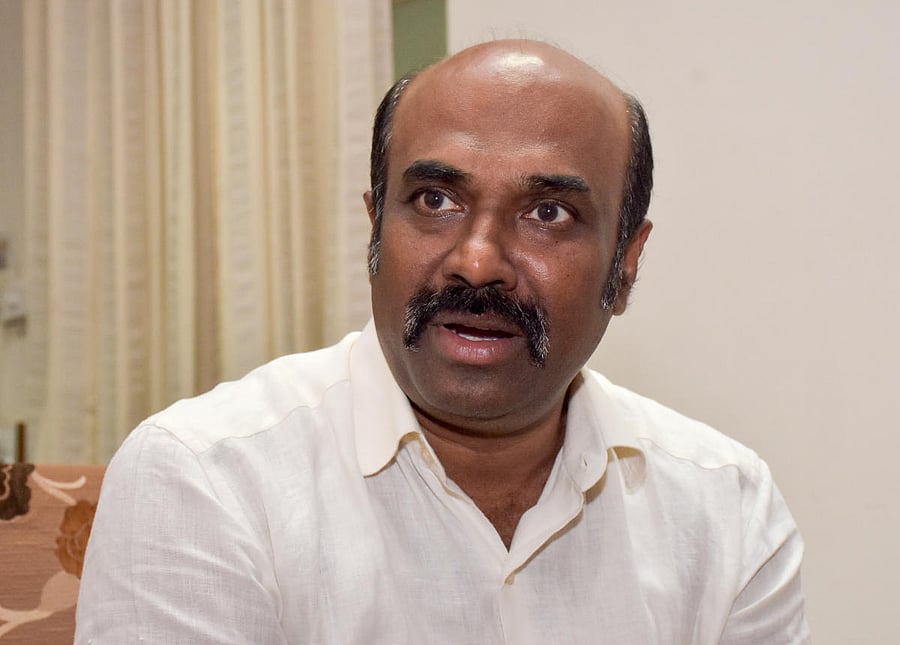
Chief Executive Officer of Zilla Panchayat A M Yogeesh, who was recently promoted to Indian Administrative Service (IAS), said that his stint as KAS officer in the Revenue department and a few government agencies will help him in his new assignment.
Alpahalli Marisiddegowda Yogeesh, a 2004 KAS officer, was born and brought up in KR Pet town and attended college in Mysuru. He also graduated in Law in Malavalli. Before being promoted to IAS, he worked as Secretary of Mysuru Urban Development Authority (MUDA), as Assistant Commissioner of Koppal and Kollegal sub-divisions, as Deputy Administrator of Cauvery Command Area Development Authority (CADA), as Secretary of Karnataka Housing Board, as Additional DC of Bengaluru Rural, as Chief Administrative Officer of Karnataka Rural Infrastructure Development Limited (KRIDL) and Additional Regional Commissioner in Mysuru.
Speaking to DH, Yogeesh, said that having studied and worked for over a decade in Mysuru, he has a clear picture of the region and hopes to give his best in his first posting as IAS officer, only to do better in future assignments. He has his roots in Nagamagala taluk, was brought up in KR Pet taluk, studied in Mysuru and Malavalli taluk, and worked in Bengaluru and parts of North Karnataka, getting diverse exposure and experience.
Will the exposure and experience in various government departments and agencies help in the ZP?
The Revenue department identifies and grants lands for solid waste management units, graveyards and other projects implemented by the ZP. The KRIDL is involved in construction of various buildings for various projects executed by the ZP. CADA is involved in creating awareness about judicious use of water, crop pattern and providing guidance to Water User Associations in rural areas. Thus, by understanding the importance and significance of coordination between various departments and agencies, for the welfare of the people, I will strive for the successful implementation of the schemes and projects under the ZP.
What excites you in the ZP?
As a person born and brought up in rural areas, during a substantial duration of my childhood, I know the joys of rural life and also the problems ailing the rural people. There are some new projects and schemes under the ZP that will do good for rural people. Mahatma Gandhi Employment Guarantee Act (MGNREGA) is an useful legislation, that will help rural people, if it is implemented effectively.
Jal Jeevan Mission (JJM), envisioned to provide safe and adequate drinking water through individual tap connections by 2024 to all households in rural India, will transform the lives of the deprived class. JJM will also implement source sustainability measures such as recharge and reuse, through grey water management, water conservation, and rainwater harvesting. It is based on community approach to water and will include extensive information, education and communication. JJM aims to make water, everyone’s priority.
Under Mysuru ZP, we have identified 1.31 lakh households in 652 villages for JJM in the year 2020-21. It includes a campaign to provide tap water to schools, anganwadis, and Ashrama schools. A minimum of three taps — one for drinking, one for washroom and one for kitchen — is intended for each institution.
Projects like sanitation, water supply, drainages, waste management, anganwadi convergence and digital libraries will make villages better places to live.
What plans do you have for reforms, within your limits?
Of late, mid-tier Taluk Panchayats are touted as not significant. I wish to convene a meeting to TP Executive Officers, presidents and vice-presidents to explore ways to make them relevant and useful for the welfare of people. They will also be actively involved in the schemes and projects executed by the ZP and Gram Panchayats. I hope to engage all EOs via video-conference on a daily basis.
In each taluk, one GP can be identified to be developed as a model. Each village should evolve into an autonomous and self-sustaining entity, like they used to be in earlier times. Migration from villages to towns and cities should by minimised.